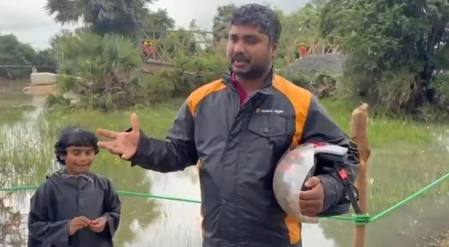
Brasilia, Nov 14 (IANS) The Sweden based-Stockholm Center for South Asian and Indo-Pacific Affairs (SCSA-IPA) at the Institute for Security and Development Policy (ISDP) participated in the 30th session of the Conference of the Parties (COP 30) in Brazil’s Belem city, followed by high-level dialogues in Rio de Janeiro, to highlight one of the world’s most neglected ecological flashpoints and the rapidly worsening climate crisis across Tibet and the Himalayan region.
The delegation, led by Jagannath Panda, Head of SCSA-IPA, and joined by Richard Ghiasy, Senior Associate Fellow at SCSA-IPA and Director of GeoStrat (The Netherlands), attended COP30 as observers, focused on expanding global awareness of high-altitude climate vulnerabilities. The delegation highlighted that the Tibetan Plateau, Asia’s “Third Pole”, is undergoing an ecological breakdown, which the global climate governance can no longer ignore.
“COP30’s central themes of Amazonian preservation, indigenous environmental rights, and sustainable development have rightly captured global attention. Yet, the SCSA-IPA team noted that another ecosystem of planetary significance, Tibet, remains conspicuously underrepresented in international climate discourse. The Tibetan Plateau is warming nearly three times faster than the rest of the world, triggering rapid glacial retreat, permafrost degradation, and destabilisation of major river systems,” a statement said.
In meetings with climatologists, indigenous rights specialists, and environmental researchers in Belem, Panda emphasised that the consequences of Tibet’s environmental deterioration extend far beyond China’s borders. The Tibetan Plateau feeds ten major river systems, sustaining nearly 2 billion people across South Asia and Southeast Asia. The loss of ice reserves shifts in precipitation patterns, and intensifying water scarcity downstream could reshape the region’s food security, energy planning, disaster vulnerability, and geopolitical dynamics.
According to the statement, the crisis is compounded by Beijing’s expanding hydro-infrastructure, including dams and diversion schemes along major transboundary rivers. It added that the newly proposed China’s Medog Water Diversion Project stands out as an initiative with profound implications for downstream countries, one that could alter the ecological balance of the Brahmaputra basin and aggravate regional insecurities.
“Mining pressures add another dimension to the ecological threat. Rising extraction of lithium, rare earths, copper, and other resources across Tibet has disrupted fragile mountain terrains and contributed to soil degradation and habitat loss. Simultaneously, the forced relocation of Tibetan nomadic communities has weakened long-established systems of high-altitude environmental stewardship,” the statement mentioned.
–IANS
scor/vd




